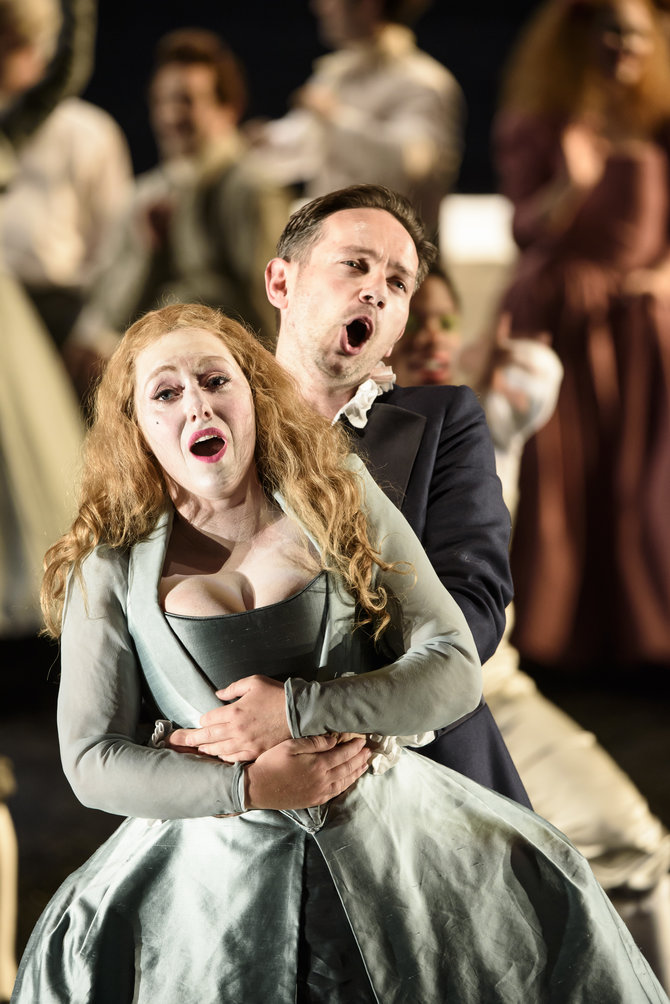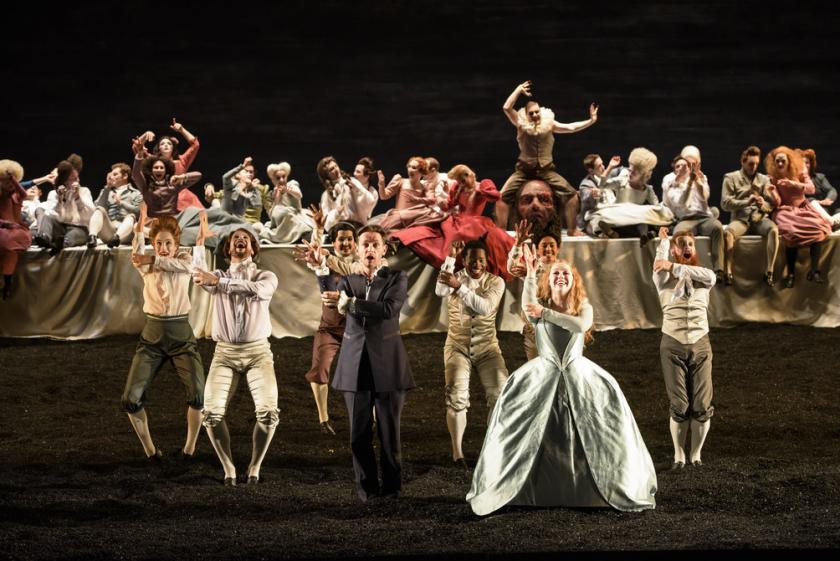I can’t remember a time I felt so profoundly disquieted by a Handel staging. It’s partly that, as an oratorio, Saul breaks so many dramatic rules that lend the operas their reassuring structural certainty, but there’s also something – a tenderness certainly, but also a violence – to Barrie Kosky’s production that uncouples the music from any residual cosiness England’s favourite adopted composer still inspires in British audiences. It’s unsettling and exhilarating in about equal measure, a startlingly sensitive and telling statement from a director better known for his dramatic shock-and-awe.
If the Glyndebourne audience were braced for something provocative from Kosky on opening night then they were right, but for all the wrong reasons. Starting with an overture played straight, curtain down throughout, the Australian director puts the score first. Respectful but never reverent, this is a production whose interest lies in gaps exposed between score and staging, as well as the silences – defiantly and dangerously long at times – between musical statements.
A production that’s all excess, exaggeration, extremity
Establishing itself in the cracks of the drama, Kosky’s tale takes the familiar Bible story of David (fresh from victory of Goliath) and his unwitting overthrow of the maddened and tyrannical King Saul, and shades it in his signature moral greys. Innocence – Sophie Bevan’s Michal, even Iestyn Davies’s David – is up for debate, veering from giddy, inane glee to a coldness that speaks of more than a hint of repression in our hero: not perhaps the brave new ruler the final choral sequence would hope.
But if morality is smudged and cloudy, the visual drama is anything but. The curtain rises on a spectacular tableau: a cornucopia of fruit and flowers, animal carcasses and stuffed peacocks, spread out before a chorus of wigged and painted Israelites. Part Peter Greenaway set, part Flemish Baroque still-life, it’s a gorgeous grotesque – a touchstone image for a production that’s all excess, exaggeration, extremity. Even more striking is the opening of Part II – a visual that drew spontaneous applause on opening night with its beauty and abundant camp. Otto Pichler’s idiosyncratic choreography brings designer Katrin Lea Tag’s bold designs to convulsive life throughout, with movements that are baroque by way of MTV.
 Saul may be among Handel’s finest oratorios, but it struggles with one of the poorest texts. Charles Jennens (he of Messiah fame) fails to find emotion or narrative drama in his convoluted phrases – “Such haughty beauties rather move aversion than engage our love” – suggesting a nation at war with its own civilisation, a people silenced by their abundant, empty language. It’s an issue Kosky makes a virtue of in his caricature Israelites – puppets animated by the motions of grief or joy, but oddly uninvolved. These he sets against the Lear-like figure of Christopher Purves’s Saul, an extraordinary piece of singing-acting that makes madness – unlovely, vulnerable, mercurial – poignantly human.
Saul may be among Handel’s finest oratorios, but it struggles with one of the poorest texts. Charles Jennens (he of Messiah fame) fails to find emotion or narrative drama in his convoluted phrases – “Such haughty beauties rather move aversion than engage our love” – suggesting a nation at war with its own civilisation, a people silenced by their abundant, empty language. It’s an issue Kosky makes a virtue of in his caricature Israelites – puppets animated by the motions of grief or joy, but oddly uninvolved. These he sets against the Lear-like figure of Christopher Purves’s Saul, an extraordinary piece of singing-acting that makes madness – unlovely, vulnerable, mercurial – poignantly human.
The Cordelia and Goneril/Regan to Purves’ Lear, Bevan’s Michal and Lucy Crowe’s Merab point to a new generation shaped by their father’s madness, perhaps even sharing it. Singing of characteristic control and purity from Crowe chafes against her tempestuous anger, while Bevan makes the most of Kosky’s bleak vision for his heroine, turning her goodness and meekness into something rather more base. Vocally, however, it’s an impressive house debut and a match for Iestyn Davies’s exquisite David (pictured above with Bevan). There’s an unearthly quality to this voice that sets it effectively apart from all around it, but grounded in a muscularity that makes a credible warrior of a figure we first encounter bloodied and bruised from the fight. I’m not sure Kosky’s predictable take on the "more than woman’s love" between David and Jonathan (a rather uneven Paul Appleby) adds much, but it’s an effective means of curdling a pious tale into something more uncertain – an effect taken to extremes in Saul’s bizarre encounter with the Witch of Endor (John Graham-Hall). Those of a more sensitive disposition may want to look away at this point.
The chorus, barely absent throughout, are the musical rock here. Handel’s extended fugal choruses don’t lend themselves naturally to memorisation, but by doing so the singers achieve a power few choirs could match. We move from overpowering volume to a hushed pianissimo, all minutely articulated and sensitive to conductor Ivor Bolton’s shading. It’s the final piece in a puzzle of a production that confronts and surprises but also moves – a serious and worthy successor to Glyndebourne’s fine repertoire of Handel stagings.
- Saul at Glyndebourne until 29 August and then on tour














Add comment